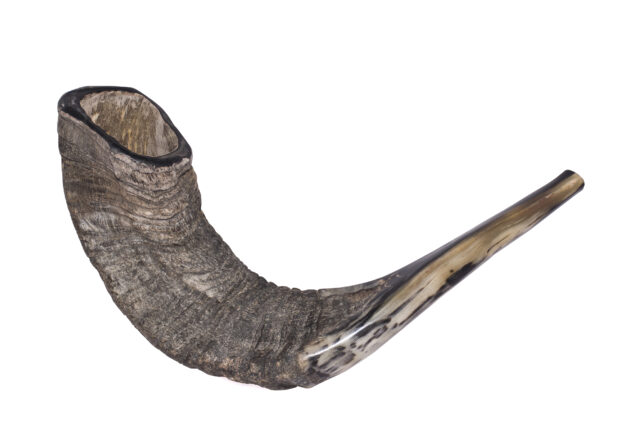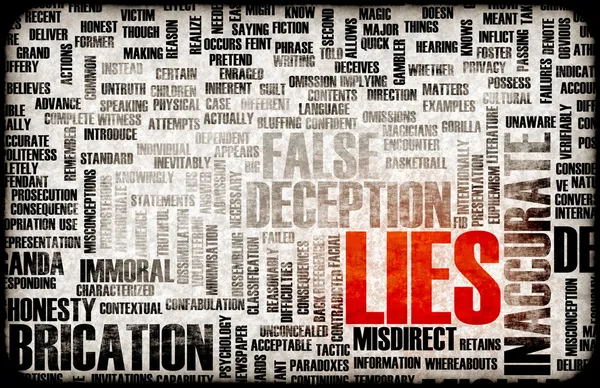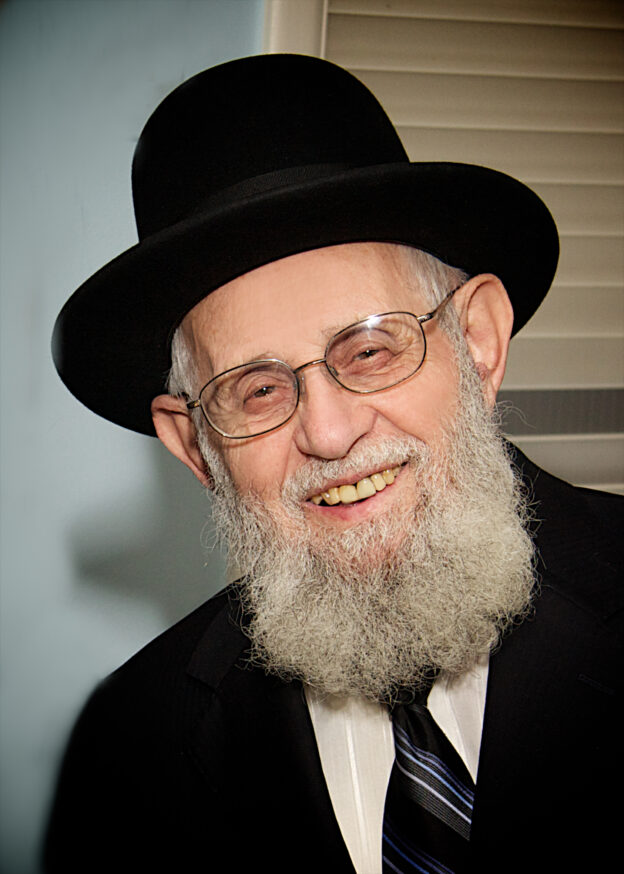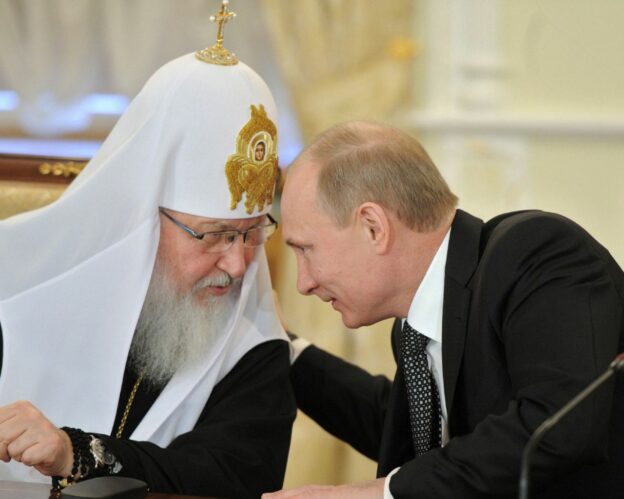
Recent reports about the current and former president inspired a thought about the wisdom of the Hebrew alphabet.
And that thought can be read here.

Recent reports about the current and former president inspired a thought about the wisdom of the Hebrew alphabet.
And that thought can be read here.

The word “vayehi,” famously, introduces something negative or unfortunate. Why, then, asks the Mei Marom (the polymath Meshullam Gross), does it introduce the pasuk stating that Avraham “owned sheep, cattle and donkeys” (Beraishis 12:16) – the fact that our forefather had achieved great wealth?
The obvious answer, says Rav Gross, is that, to Avraham, wealth was a burden that could only negatively affect his service to Hashem. In fact, shortly thereafter, the pasuk describes how Avraham was “very laden” with livestock, silver and gold” (ibid 13:2). The word translated “laden” – caveid – literally means “heavy” and implies a burden.
And so, Rav Gross continues, that may explain why Avraham is described in several places (including in our parsha (ibid 12:9) as traveling southward.
Because, as Rabi Yitzchak (Bava Basra, 25b) says, one who wants to become wealthy should be yatzpin, face north, when he prays; but one who wants to become wise should be yadrim, face south.
Avraham wasn’t a seeker of wealth. On the contrary, he saw it as a burden. He pined for wisdom.
Can one have both? Certainly, and Avraham did.
But, as is clear from Rabi Yitzchak’s contention, one can only pursue one or the other; striving for both is futile. After all, it’s impossible to face both north and south simultaneously.
© 2022 Rabbi Avi Shafran

The closest word for “hero” in Hebrew is gibor, often translated as “a strong man.” And its true definition is provided in the fourth chapter of Pirkei Avos: “Who is a gibor? He who conquers his natural inclination, as it is said: ‘Better is one slow to anger than a strong man, and one who rules over his spirit than a conqueror of a city’ (Mishlei 16:32).”
True strength in Judaism is evident not in action but in restraint, not in outrage but in calm.
In parshas Noach, we meet a very different kind of gibor, a gibor tzayid, a “strongman hunter” (Beraishis 10:9). His name is Nimrod, his goal was power and, as Rashi notes, based on the Targum Yerushalmi and midrashim, what he hunted was human followers, attracting them with braggadocio and bluster.
Nimrod was the first “hero” to harness power in order to, in Rav Shamson Raphael Hirsch’s words, “trap men for [his] own egoistic purposes.” He sought to “subjugate the less strong and clear-sighted, to keep them under his yoke until he would need them…”
As such, Nimrod exemplifies, continues Rav Hirsch, “the evil of tyranny which [has] continued so perniciously through the history of nations.”
And which remains as true today as ever.
And Nimrod was a gibor tzayid lif’nei Hashem, a strongman hunter before Hashem. Explains Rav Hirsch: “[Nimrod] misuse[d] the name of God, cloak[ed] his domination under the show of its being pleasing to God… to demand[ing] recognition of his power in the name of God.”
Indeed, today, too, we daily witness the scowls of scoundrels and liars bent on amassing personal power invoking divine “values” as a means of attracting religious followers who mindlessly regard the speechifying would-be dictators as “heroes.”
May we be spared such gibborei tzayid. And merit to see – and be – true gibborim, those described in Avos.
© 2022 Rabbi Avi Shafran

Imagine a man who has spent years waiting for his daughter, his only child, to get married, and then, as he surveys the lavish wedding hall on the day of her wedding, is arrested by police and dragged off to jail. What anguish he would feel.
It would be but the faintest shadow of the agony Moshe must have felt when he was shown the land promised to Klal Yisrael, the land to which he led the people for 40 years, and was told by Hashem that he will not enter it, that he is about to die.
And so, when the Midrash, quoted by Rashi, says (in response to the question of how Moshe could record the fact that he died) that Moshe wrote the words bidema, “in tears,” the simple meaning is that he wrote of his death while still alive. (Torah, being beyond time, allowed for that fact). And that his tears were over his having been deprived of entering Eretz Yisrael.
He cried. Like all us humans, imbued with emotions, do. And the “sin” that prevented him from entering the land, his frustrated hitting of a rock instead of speaking to it, also reflected an all-too-human emotion. Moshe was unique among human beings, to be sure. He was anav mikol adam, more humble than any other person. But a person, all the same; he was a mortal human being.
My rebbe, Rav Yaakov Weinberg, zt”l, would often note that other religions’ heroes are described as faultless superhumans. Not so the personages who are extolled by the Torah, even Moshe Rabbeinu, who was, although closer to perfection than anyone, still human. He erred. He cried.
And that uniqueness of the Torah, Rav Weinberg would stress, is a reflection of the fact that, unlike the “holy books” of various religions, it alone is Hashem’s word, not the product of a fabulist human writer.
© 2022 Rabbi Avi Shafran

With Yom Kippur approaching, I used my Ami column to share a cherished erev Yom Kippur interaction I had a number of years ago with my dear father, a”h. You can read it here.

Fact-free fantasies are all the rage
Shameless charlatans and flagrant fabulists are nothing new. But they seem to be proliferating rather wildly these days.
In only the latest of a slew of recent such scams, a man was just sentenced to five years in prison after raising $400,000 in a GoFundMe campaign, ostensibly for a homeless veteran. He and his companion spent much of the money on gambling, a BMW, a trip to Las Vegas, a helicopter ride over the Grand Canyon and designer handbags.
Then there’s Alex Jones, the conspiracy theorist radio host and operator of the website InfoWars, who, after a Texas jury’s ruling this month, must pay $45.2 million in punitive damages, in addition to $4.1 million in compensatory ones for spreading the lie that the 2012 Sandy Hook Elementary School shooting was a hoax “staged” by the government so it could “go after our guns,” and that none of the 20 children killed in that attack had actually died.
He called those all-too-real childrens’ parents, who had to identify and bury the bullet-riddled bodies of their young ones, “crisis actors,” resulting in their being retraumatized, and harassed and hounded by some of Jones’ faithful followers.
Previously, the popular fabler endorsed the “Pizzagate theory”—that Democratic Party operatives ran a global child-trafficking ring out of a DC pizzeria—and implied that a yogurt company was linked to an assault case and helped spread tuberculosis, both of which fact-free fantasies he was later forced to apologize for promoting.
Apparently inspired by Mr. Jones, Georgia Representative Marjorie Taylor Greene suggested that the man who opened fire on a Fourth of July parade in Highland Park, Illinois, this year, killing six, might have been part of an orchestrated effort to persuade Republicans to support gun control measures.
Millions of Americans believe, without evidence, that the 2020 presidential election was “stolen”; and millions, too (though there’s likely considerable overlap), that the 9/11 attacks were perpetrated by US government agents. Among the latter group is Michael Peroutka, the Republican Party nominee for Maryland attorney general.
According to a new study by UNESCO, approximately half the public content related to the Holocaust on the Telegram messaging service denies or distorts facts about the extermination of millions of Europe’s Jews.
And, with each year leaving us with fewer human witnesses to that evil, the noxious weeds of Holocaust denial are bound to infest the history garden.
Poised, too, to become a powerful engine further impelling our era of lies are “deepfakes.”
Those are videos produced with special software that makes it seem that an identifiable person is saying or doing something he or she has, well, neither said nor done. Photoshop on steroids.
The software, readily available and being constantly refined, can alter the words or gestures of a politician or other public figure, yielding the very fakest of fake news.
In 2019, Senator Marco Rubio, a member of the Senate Intelligence Committee, warned that “America’s enemies are already using fake images to sow discontent and divide us. Now imagine the power of a video that appears to show stolen ballots, salacious comments from a political leader, or innocent civilians killed in conflict abroad.”
According to a report released last week by technology company VMware, attacks using face- and voice-altering technology jumped 13% last year.
“Deepfakes in cyberattacks aren’t coming,” the company’s Rick McElroy said in a statement. “They’re already here.”
In March, for one example, a video posted to social media appeared to show Ukrainian President Volodymyr Zelensky directing his soldiers to surrender to Russian forces. It was a deepfake.
The 24-hour news cycle and expansion of social media platforms only compound the problem. “A lie,” as the saying often attributed to Mark Twain goes, “can travel halfway around the world while the truth is still putting on its shoes.” Today, it’s gone all the way around the world before truth even finds its shoes.
So there is ample cause for despair. Lies upon lies exposed, many more still claiming the gullible and a likely empowering of falsehood-promotion in the not-distant future.
But cause, too, perhaps, of hope.
Because Chazal (Sotah 49b) foretold that ha’emes tehei ne’ederes, “truth will go missing” one day: When the “footsteps of Moshiach” are approaching.
(c) 2022 Ami Magazine

You might not recognize the name Nancy Patricia D’Alesandro, but you surely know the lady by her current name: Nancy Pelosi.
Her original surname, though, resonates with some of us Jewish “Bawlemorians.” If you’re interested in knowing why, click here.

The law of kana’im pog’im bo – “the zealous ones can attack him” – that Pinchas acted upon to dispatch Zimri and Kozbi is a highly unusual, if not singular, one: If one poses it as a halachic query, it is rendered a forbidden act; but if acted upon without consultation, it is meritorious. How can something prohibited be a mitzvah? We find yibum rendering what was an aveira (relations with one’s brother’s wife) a mitzvah, but there the situation has changed, with the death of the brother. Here, the same act under the same circumstances is both wrong and right.
In physics, there is something called the “observer effect,” referring to the fact that the act of measuring something affects what is being measured. For instance, a thermometer placed in a liquid can’t truly measure the liquid’s temperature, since the thermometer’s own temperature changes the liquid’s (and using a thermometer with the same temperature as the liquid would require knowing the liquid’s temperature beforehand).
The observer effect is even more pronounced in quantum physics, where even the most basic act of observation disturbs the state of subatomic particles.
I wonder if something like the “observer effect” may exist in the halacha of kana’im pog’im bo. The act itself, in its essence, is proper; it is the introduction of self that changes the status of the law, rendering the act forbidden.
If the aspirant to the status of “zealous” has the presence of mind to query whether he should act, the answer is that he should not. Once a he has entered the situation, it changes what was permitted, even meritorious, into something forbidden. With the introduction of self, everything changes.
When an act of kana’us is performed automatically, though, devoid of “self”-consciousness, without consideration of its potential impact on oneself, it is praiseworthy. And Pinchas, who acted out of pure dedication to Hashem, with no concern for self, is rightly praised.
© 2022 Rabbi Avi Shafran

After disembarking from the SS Ernie Pyle, the transport ship that brought World War II refugees from Europe to the United States in the late 1940s, my father used the $75 dollars provided him by the social service Hebrew Immigrant Aid Society to buy a pair of tefillin.
Those are the small black leather boxes containing verses from the Torah that observant Jewish men don on their arms and head daily. The pair he had with him, from his bar mitzvah in the shtetl, had not fared well over the war years.
Simcha Bunim Szafranowicz was in his early 20s when he arrived, and had spent the war years, first, as a young teen, fleeing the Nazis when they invaded his native Poland; and later, after being captured in Russian-controlled territory, banished along with a group of his fellow yeshiva friends and their teacher to a work camp in Siberia.
For many years, he didn’t speak about his wartime experiences to his three children, I being the middle one. When we became adults, we urged him to recount the experiences of his own young adulthood.
Once our father began to share his recollections, they came out in a torrent.
He told us about how, when the Nazis invaded Poland and his entire town fled the approaching troops, he, a 14-year-old, and his fellow shtetl-folk, were captured in a nearby town where they had sought refuge. The group of refugees was crowded and locked in a synagogue. Then, nearby houses were set aflame. The boy, like the others, expected to die there.
But they were saved, at the last moment, incredibly, by a passing Nazi officer, who berated the soldiers who had acted without orders. My father and the others suspected the officer was Elijah the prophet in disguise.
Shortly thereafter, he told us, the “stubborn boy,” as our father described his younger self, took leave of his parents – whom he would never see again – to board a train to a city with a yeshiva. He had always wanted to study in one.
But the yeshiva he managed to get to, in Vilna, Lithuania, was overtaken by the Russians, and its Polish students and faculty were given a choice: become Russian citizens or be banished, as foreign nationals, to a work camp in Siberia.
They chose the latter. After a weeks-long, packed cattle-car train journey to the far east of the continent, he and his fellow yeshiva boys and their teacher were put to work chopping down trees in temperatures that reached 40 degrees below zero. Once he became seriously ill there and almost died.
After the war, he and the others made their way to the Soviet sector of Berlin, from which they were smuggled to the American section — during which dangerous trip my father was shot in the upper arm. He showed us the scar, which we had never noticed before.
The boys and their teacher re-established their yeshiva in an Austrian city called Salzburg, where they prayed and studied until they could find ways to leave the blood-soaked soil of Europe for faraway lands like Palestine or the U.S.
My father managed to contact a distant relative in America, who sponsored his immigration to the country he would come to cherish. He shortened his surname and met our mother, who had arrived from Poland herself but before the war. Their dates in New York consisted of riding the subway together, and his singing Hebrew and Yiddish songs – he had a keen sense of music and a sweet voice – for her.
The couple moved to Baltimore and my father, with my mother’s tutoring him in English (which he mastered perfectly), eventually became the beloved rabbi of an Orthodox congregation that he ended up serving for more than a half century. To make ends meet, he attended the University of Baltimore and received a degree in accounting, which served him well as he juggled his synagogue duties, his family and his job as an auditor for the city.
There are stories galore I can tell about the impact he made as a rabbi on countless Jewish men and women, boys and girls. Not to mention about the veneration he came to receive from his children, grandchildren and great-grandchildren — and countless people who just happened to cross paths with him.
He was called to heaven six years ago, when he was 91. As he breathed his last breaths in my brother’s home, where he had been living for a number of months, he mustered the energy to quietly ask the family members around him for something. It wasn’t clear what.
But my sister-in-law deciphered his request and told my brother, who took my father’s tefillin and placed them lovingly on our father’s arm and head.
© 2022 Rabbi Avi Shafran

Heard the one about the mysterious $30,000 watch that was digitally removed from a photograph? The one where the photoshopper inadvertently overlooked the timepiece’s reflection on a polished table?
No? Well, please be patient. I’ll get to it.
First, though, some history of Christianity. (Yes, yes,, the watch story is coming.)
In 1054, a complex mix of religious disagreements and political conflicts led to what historians call “The Great Schism,” the splitting of Christendom into two branches: the Western Roman Catholic Church and the Eastern Orthodox one, the latter centered in Constantinople, today Istanbul. (As the 1953 song has it: “Why did Constantinople get the works? That’s nobody’s business but the Turks’.”)
Subsequently, a number of Eastern Churches established themselves. Among them are the Russian Orthodox church, one of the largest, some 90 million strong; and the Ukrainian one, with around 30 million adherents.
The current leader of the Russian church was born Vladimir Mikhailovich Gundyayev but is called Patriarch Kirill. He is a close ally of Russian President Vladimir Putin, sharing with him the vision of a “Russkiy Mir,” or “Russian World,” linking religious unity and territorial expansion; and he has not been shy about celebrating the Russian invasion of Ukraine.
Like practically all elite Russian clerics of the post-World War II era, Kirill is believed to have collaborated with the K.G.B., where Mr. Putin worked as a foreign intelligence officer for 16 years.
But Kirill wasn’t always a Putin minion.
At the end of 2011, he voiced criticism of fraudulent parliamentary elections. (In Russia, widespread election fraud is a reality.) And he said it would be “a very bad sign” if the Kremlin did not pay attention to the electoral mendacity.
Shortly thereafter, though, Russian media began reporting on luxurious apartments owned by Kirill and his family; as well as on rumors of billions of dollars in secret bank accounts, Swiss chalets and yachts.
And then (thanks for your patience) there was the watch, a Breguet Réveil du Tsar model, a rather high-end item.
A news website dug up a photograph from 2009 in which Kirill wore one. His underlings edited it out of the photo but neglected to edit the watch’s reflection on the highly-polished table on which the patriarchal wrist was resting.
After the ineffectual airbrushing, Kirill denied ever wearing such a watch, but its reflection on the tabletop ended up eliciting an embarrassed apology from the church.
According to a personal assistant to the patriarch, the orchestrated tarnishing of his reputation was interpreted by Kirill as a message from the Kremlin to behave.
And behave he did, ceasing all criticism of the Kremlin and throwing his full religious weight behind its decisions, including the one about conquering Ukraine. He called on the public to support the war so that Russia can “repel its enemies, both external and internal.”
Needless to say, the Ukrainian church has blasted Kirill, as have other Eastern Orthodox churches. And even the current Roman Catholic pope, Francis, who has made great efforts to bridge the gap between the Eastern and Western churches, tried to get Kirill to stand up to Mr. Putin. To no avail.
The pontiff reportedly told his Eastern colleague, “Brother, we are not clerics of the state,” but Kirill just read him a Russian claim that the invasion was necessary to protect “the Orthodox faithful” in Ukraine who remain loyal to the Russian church.
The pope later effectively warned Kirill, in a statement in the Corriere della Sera newspaper, not to “transform himself into Putin’s altar boy.”
Sergei Chapnin, a senior fellow in Orthodox Christian studies at Fordham University who actually worked with Kirill in the Moscow Patriarchate, compared the situation to the “mafia,” saying that “If you’re in, you’re in. You can’t get out.”
The Mob really is no place for a monsignor.
Kirill once told Russian state television that his grandfather, a churchman like himself, told him to never “be afraid of anything but G-d.”
It’s time for the grandson to include Putin in that “anything.”
Time, indeed. If he needs to, he can check his watch.
© 2022 Ami Magazine